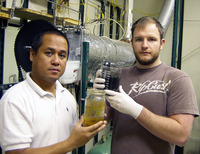
CE-CERT development engineers Junior Castillo (left) and Eddie O’Neil (right) display the results of the steam hydrogasification process that converts urban waste feedstock (rear container) into clean synthetic diesel fuel (foreground container). The fuel was produced in the lab-scale reactor behind them.
University of California, Riverside’s College of Engineering-Center for Environmental Research and Technology (CE-CERT) has been awarded a $1 million grant from the California Energy Commission to build a demonstration plant to convert biosolids to clean synthetic diesel fuel. As evaluated by the National Energy Technology Laboratory of the U.S. Department of Energy, this process is 12 percent more efficient and 18 percent lower in capital costs than all other mainstream gasification technologies.
The plant will use a steam hydrogasification process coined the “CE-CERT Process,” to convert biosolids from the the city of Riverside’s wastewater treatment facility, along with other ‘waste’ feedstocks, to produce energy. The state of California has committed to reducing its petroleum use by 2.4 billion gallons per year, and the intent for the fuel produced using this process is to be integrated into the transportation mix as a clean alternative to fossil fuels.
According to a UC Riverside news statement, California produces an estimated 83 million dry tons of biomass wastes per year, including agricultural and forestry wastes and wastewater treatment biomass that must be disposed of. Virtually 32 million dry tons of this biowaste are estimated available for fuel production.
According to researchers, the advantages of this process are many including access to a diversity of feedstocks that typically go to landfills, lower capital investment required to build a plant, and smaller plants can be located near the feedstock sources for an economic and environmental advantage.
Proof of technology of the pilot plant is the last step before full scale commercial production.

